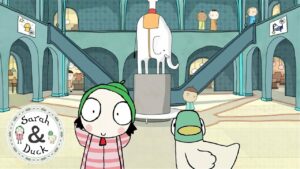Everything you've always wanted to know about the subjunctive, from LetThemTalkTV.
Are you in a good mood? Are you in a bad mood?
I hope you're in a subjunctive mood because that's what we're going to learn today on LetThemTalkTV.
Some things you have to know about the subjunctive.
It's easy.
We use it.
It's interesting.
It sounds good.
We're going to look at when you use it in a sentence as well as some fixed expressions that contain the subjunctive.
It's easy! Don't believe me?
Let's have a look at the conjugation of the present subjunctive.
It's the infinitive without "to".
That's it.
So, take a verb like "to speak". The infinitive is "to speak".
Let's conjugate it.
I speak.
You speak.
He, she, it speak.
We speak.
They speak.
Didn't I tell you it was easy?
So, you'll notice that the only difference from the indicative of the verb, that is, the normal conjugation, is that there is no S in the third person.
So, the only change is in the third person singular, except the verb "to be".
Remember that the subjunctive is the infinitive without "to".
So, "to be", remove the "to", you get:
I be.
You be.
He, she, it be.
We be.
They be.
the work to have remove the two I have you have he she it have, we have, they have.
So, now we know how to conjugate it in the present tense, we'll do the past subjunctive in a moment, and that's even easier.
Let's see how and when we use it.
We use the subjunctive to say that the thing we are talking about could happen, but it's not yet certain.
There is perhaps a doubt, or it's hypothetical.
In English, we don't use the subjunctive as much as some other languages because we already have ways to express this mood.
And that is using modal verbs such as "might" or "may" or "would".
So, first of all, master the modal verbs, and we have a video about that, okay?
So, you've done that, let's go on the subjunctive.
When native speakers use the subjunctive, often they don't even know that they are using it.
If you study the subjunctive in your own language or another language, you will already have a feel for it, so it's going to be pretty easy.
I know I keep using the word "easy", don't I? But stay with me, you'll see I'm right.
All you need to do is learn a limited number of words and phrases that are followed by that clause and then the subjunctive.
And a few expressions that contain the subjunctive. That's it.
There are perhaps 20 or 30 words and phrases that might take the subjunctive.
Here is a list of some of the most common ones, okay?
So, let's have a look at a few of them.
Let's start with "suggest".
You put the subjunctive in the clause after the word that takes the subjunctive, in this case "suggest". okay?
"I "suggest". that you take the train."
Remember what we said about the conjugation?
So, "take" in the subjunctive is conjugated:
I take.
You take.
He, she, it take.
We take.
They take.
Is this "you take" any different from the normal indicative conjugation?
No, it isn't. "You take". It's the same.
We only recognise it in the third person singular.
So with "he", "I "suggest". that he take the train".
"I "suggest". that she learn the grammar".
So, "she learn". Remove the S and that's it, you've got the subjunctive.
But what about the negative?
That's quite easy too.
With the subjunctive, we negate with "not", rather than "don't".
"I "suggest". that you not go to the interview wearing jeans."
Because we are using "not" now, you know that it's a subjunctive, even though the pronoun is "you".
Sometimes you can avoid the subjunctive. If you don't need to make it clear whom you are speaking to, then use "suggest". plus verb, plus I N G.
"I "suggest". doing some exercise."
That's fine, but who is he speaking to? We don't know.
So, if you need to make it clear, then you need the subjunctive.
"I "suggest". you", talking to you! I just... "You do some exercise"!
A common mistake:
"He suggested me to get off the couch and do something."
Remember, we use the subject pronoun here. So it is... What do you think?
"He suggested that I get off the couch and do something."
Very good!
Let's look at a few more common phrases that take the subjunctive.
"It's important that..."
"It's important that she..." Can you finish the sentence?
"It's important that she learn a foreign language."
Do you get it right? Did you leave off the S in the third person?
If you did, well done! Now, try negative.
"It's important that he..."
"It's important that he not leave before the end of the lecture."
You can avoid the subjunctive with the infinitive in this case:
"It's important to learn English", for example.
But once again, if you need to specify the person we are speaking about, we use the subjunctive.
"It's important that the candidate know English."
Let's look at a couple more instances where we use the subjunctive.
"Recommend". If the first phrase is in the past tense, you still use the present subjunctive.
"The doctor recommended that Karen eat more vegetables."
"The authority recommended...", put a negative, "...that the students not enter the room without a mask".
Okay, a few more phrases with the subjunctive.
"It is essential."
"It is essential that she learn the subjunctive."
"It is essential that you not miss this video."
"The committee requested."
"The committee requested." the president not take a holiday during the crisis."
Remember what I said about, the subjunctive is the infinitive without "to".
So, with the verb "to be" the subjunctive is "be".
And it's the same for all persons, all pronouns.
Let's look at some examples.
"Insist".
"We insist you be here on time."
"I "suggest". that you and Brian be at the next meeting."
Avoiding the subjunctive.
The present subjunctive is a little bit more common in American English than British English, but we still do use it.
I'm British and I use it.
However, some speakers will choose to avoid it sometimes.
You can do that in a couple of ways. You could place "should" before the verb.
"It's important that she know the truth", that's the subjunctive.
Without the subjunctive: "It's important that she should know the truth".
Second. In some cases you can remove "that" and use "for", a subject pronoun and an infinitive.
"It's important for her to know the truth."
Third. Some people may avoid the subjective altogether.
For example: "It's important he goes home now."
However, this is unconventional, and I "suggest". you do use a subjunctive, especially in formal speech and in writing.
Now, we're going to look at some common expressions that contain a subjunctive.
Let's start with a very common one, "whether it be".
"Whether it be".
Notice, the expression is "whether it be" and not "whether it is", so what does it mean?
It means it doesn't matter if it is X or Y. Okay?
So, for example:
"I'll take an appointment whether it be during the week or the weekend."
So, it means it doesn't matter if it's during the week or at the weekend, I want an appointment!
"I've got to get to London tomorrow, whether it be by train or by donkey!"
"Whether it be" is a common phrase, so do learn it.
"Be that as it may". This means it might be true, but...
"You say you don't have the virus. Be that as it may, you should still take the test."
So, that means you might not have the virus, but you should still take the test.
"The quote by Bigwig Systems is much cheaper than Van Liebling.
Be that as it may, I'm going to take the Van Liebling quote."
"If need be", which means "if it's absolutely necessary".
"I must release this video tomorrow. I'll work all night if need be."
Which means I must release this video tomorrow and I'll work all night if it's absolutely necessary.
"I will go to prison if need be, but I'm not paying this fine. No!"
"Come what may".
"Come what may" means "whatever happens". Let's see it in a sentence.
"I'm going to move to the big city next summer, come what may."
Which means whatever happens between now and the summer, I'm definitely moving to the big city.
"I'll be here for you, come what may."
Now, let's look at the past subjunctive.
This is even easier to conjugate than the present subjunctive, if that's even possible.
The past subjunctive is the same as the past tense, except for the verb "to be", where it is "were" for all persons.
I were.
You were.
He were.
She were.
It were.
We were.
They were.
That's easy, isn't it?
That's why we say "if I were you", and not "if I was you".
Some people might say "if I was you", but according to the grammar it's "if I were you". Okay?
You might hear "were" instead it "was" after "wish":
"I "wish": I were rich."
And in other cases we use the subjunctive, but you'll only recognise it as a past tense.
"I "wish": I won the lottery."
Do not say "I "wish": I will win the lottery", that's not correct.
With "wish": After "wish": we use an unreal past, which is a subjunctive.
"If only."
"If only she were here."
Some people would say "if only she was here".
If you want a deeper understanding of the past subjunctive and what we call the unreal past, then I've already made a video on that subject
I would say that it's vital that you watch it and tell your friend that it's essential that he or she watch it too.
Check it out here.
So, now you know how to use the subjunctive.
And if I were you, I'd go out and practise it now.
Thank you, grammarians. Have a beautiful day. See you in the next video.






